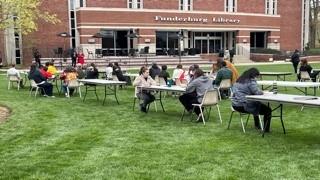 Attendees of the AAFRO 50 concert enjoyed soup from Empty Bowls while listening to performers including Maegan Pollonais, David Hupp, and the A Capella choir.
Attendees of the AAFRO 50 concert enjoyed soup from Empty Bowls while listening to performers including Maegan Pollonais, David Hupp, and the A Capella choir.
Photo by Kaleigh Gabriel
Peace Week Features AAFRO 50 Celebration Concert
Chloe Leckrone
Peace Week 2021 ended on April 17 with a concert on the steps of Funderburg Library in honor of the 50th anniversary of Manchester’s AAFRO House and AAFRO Club.
Peace Week is organized every year by the Peace Studies department and features a wide variety of events and activities across campus. This year, events included a mediation refresher with Education for Conflict Resolution, a VIA with Carol Wise on LGBT identities and interests, the annual Empty Bowls event, and the AAFRO 50 concert.
AAFRO House was established fifty years ago by a group of Manchester students, including Glynn Hines who spoke on campus earlier this semester, who wanted to create a safe and comfortable space for Black students to support one another. The formation of the club came out of a confrontation between white and Black students in Schwalm Hall that led to Black students holing up inside Petersime Chapel, an incident that garnered national media attention.
Before the concert began, President Dave McFadden addressed attendees outside Funderburg about the history of AAFRO Club and AAFRO House, saying that despite some good coming out of the Petersime incident, more work is still to be done at Manchester regarding racial justice today.
The concert happened alongside the Empty Bowls event, from which proceeds will go to the Poor People’s Campaign. Students, faculty, staff and community members gathered on the mall, many enjoying soup out of their painted bowls, to listen to the live music. Performers included Maegan Pollonais, director of Student Diversity and Inclusion, Manchester’s A Capella choir, and David Hupp, adjunct instructor of Music and member of the local band Friends with the Weather.
Pollonais, who has a doctoral degree in music, was joined by Dr. Rory Wallace, a friend of hers from graduate school. Pollonais began with “L’Amour est un oiseaux rebelle” from the opera “Carmen,” showcasing her talent with operatic pieces. Next, Wallace sang “It Ain’t Necessarily So” from the opera “Porgy and Bess” which transitioned into the African American spiritual “Sometimes I Feel Like a Motherless Child.” Finally, Pollonais and Wallace came together to perform a duet from the musical “Ragtime.”
The A Capella choir performed next, selecting a variety of works including an Indian raga comprised of “percussion noises” rather than words, as Director Debra Lynn put it, and “Let Everything That Hath Breath.” Their portion of the concert closed with “We Shall Overcome.” The first few verses built on the previous ones, growing louder and adding more parts, until the third verse swelled with full harmonies before going into a much quieter final verse, softly coming to rest on the line, “We shall live in peace someday.”
The last performer of the day was David Hupp, who played a number of blues songs on his acoustic guitar. Many of the songs were by Black American artists in honor of AAFRO 50, including Willie Dixon and Tracy Chapman. Hupp also performed “Sunny,” a song that he explained Bobby Hebb began to write in the aftermath of his brother’s murder and John F. Kennedy’s assassination. He noted that despite it sounding like a simple love song, this understanding of the song paints a much different and more affecting picture.
This is not the first time Peace Week has featured a concert. “Peace Week and the Empty Bowls fundraising event happen annually, and usually include a musical component,” said Virginia Rendler, Peace Studies Coordinator and organizer of Peace Week events. “This year, we were lucky enough to be able to collaborate with the AAFRO House 50th Anniversary Commemoration and honor the legacy of AAFRO Club.”
Rendler went on to note the ability music has to lend a global and multicultural element as a reason for having this commemoration event specifically be a concert. “While attendees were able to read about the history of AAFRO House, they were also listening to Indian and African prayers for peace,” Rendler said. “These cross-cultural celebrations help us envision our ideal community. This event reminds us that it has been 50 years since AAFRO House was established by a few very brave Manchester students, and it was their commitment, courage, and strategic pressure that created change on campus.”